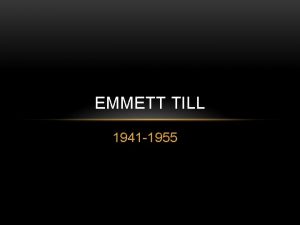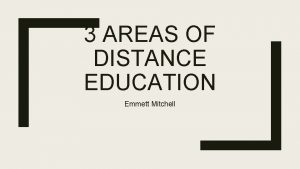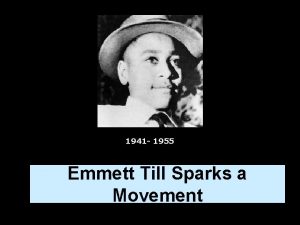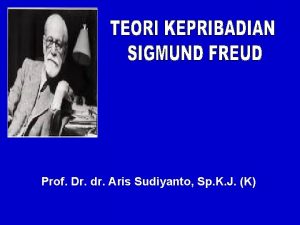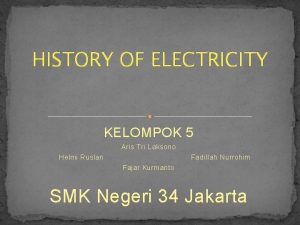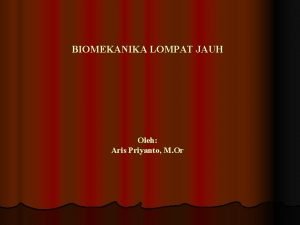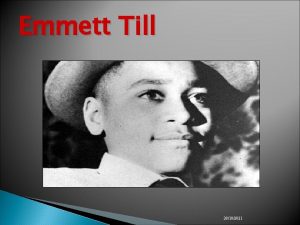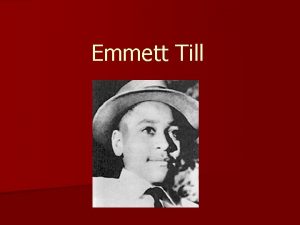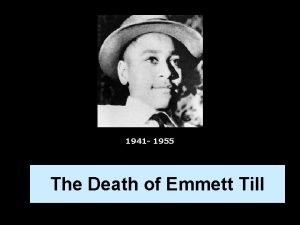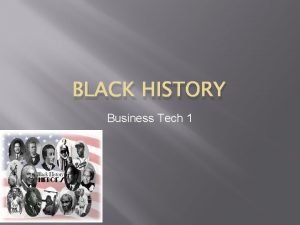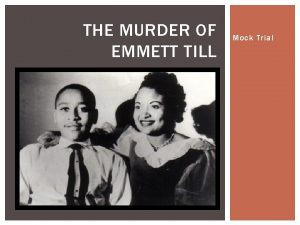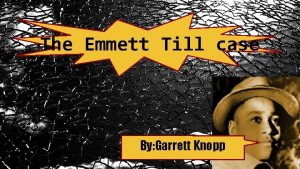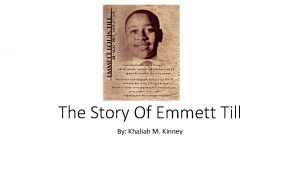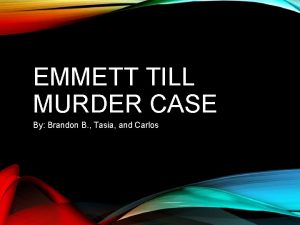ARIS Introduction English III Read the Emmett Till
















![I am, but I am not [Discussion Questions] Respond to each question in 3 I am, but I am not [Discussion Questions] Respond to each question in 3](https://slidetodoc.com/presentation_image_h2/13ae1b263260b8b535d5f1099f72198a/image-17.jpg)
- Slides: 17

ARIS Introduction English III

Read the Emmett Till article, and summarize it three ways: 1. 2. 3. Summarize in a paragraph (4 -6 sentences) Summarize in a sentence. Summarize in three words.

“Look” Magazine ● J. W. Milam and Roy Bryant were acquitted by a jury of all white men in the case of Emmett Till ● A year later, “Look” Magazine published their confession to the murder ● Milam and Bryant received $4, 000 each for the interview in 1956 (about $36, 000 adjusted for inflation) ● They could not be arrested for their confession because of double-jeopardy laws



Discussion Questions Respond on paper, in 4 -6 sentences: How do you feel about the story of Emmett Till? Respond on paper, in 4 -6 sentences: In what ways are race relations better in society today? In what ways are they the same, or worse?

16 -year-old Hawkins and three friends came to the neighborhood to look at a used car. About 30 white youths carrying bats and sticks (one with a gun) immediately approached them. The white kids were furious that the ex-girlfriend of one of the group members had invited minorities to her 18 th birthday party. They thought that Hawkins and his friends were there for the party and attacked them, shooting Hawkins dead.

1989

Roy Veal, a descendant of African American farmers who was fighting to hold onto his family’s land, was found hanging from a tree on April 23 rd in Woodville, Mississippi. Woodville is in Wilkinson County just south of Natchez. It was the childhood home of Jefferson Davis, president of the slave-owning Confederate states, and the site of his plantation, Rosemont.

2004

James Byrd Jr. , a 49 -year-old black man, was drunk and staggering down the side of the road when the three white men picked him up in the back of Berry’s pickup truck. The four men then headed out into the thick piney woods that ring Jasper on all sides. ON a logging road in the middle of nowhere, some combination the white men beat Byrd, chained him to the back of the pickup with a 24 -foot galvanized chain and dragged him until his head tore off on a culvert. They dumped his body more than three miles from their starting point, in front of a small wooden church attended by the members of the black community.

1998

Jeremy Joseph Christian fatally stabbed two people and injured a third on a MAX Light Rail train after he was confronted for directing what a police report later said "would best be characterized as hate speech toward a variety of ethnicities and religions" at two women on a light-rail train. A witness reported that Christian used anti-Muslim slurs and "was screaming that he was a taxpayer, that colored people were ruining the city, and he had First Amendment rights". The man continued directing his tirade at a young Muslim woman, age 17, who was wearing a hijab, and her non-Muslim friend, a Black girl, age 16. The man told the girls to "go back to Saudi Arabia", to get out of "his country", and "said they were nothing and they should kill themselves". He also reportedly said that "Muslims should die. " Fearful, the pair moved to the back of the train as three men—Ricky John Best, Taliesin Myrddin Namkai-Meche, and Micah David-Cole Fletcher—stepped in to intervene in an attempt to de -escalate the situation. According to a witness, Namkai-Meche told Christian in a loud voice: "You need to get off this train. Please, get off this train. " The witness said that the men attempted to form a barrier between Christian and the girls. Then Micah David-Cole Fletcher gave him "a slight push or shove" in an attempt to move him away. The man responded: "Touch me again, and I'm going to kill you. " According to police, Christian then fatally stabbed Best and Namkai-Meche, and injured Fletcher by slashing them in the neck with a knife.

2017

Discussion Questions Respond to each question in 3 -5 sentences: 1. What do you think the primary motivation was for the perpetrator of each of these hate crimes? 2. What influences our individual prejudices? 3. In what ways have you seen or experienced prejudice?

I am, but I am not. . . On the provided template, consider who you are. Focus on the intersectionality identities that make up who you are (location, age, race, gender, sexual orientation, religion, ability, education, socio-economic status). I am… But I am not…
![I am but I am not Discussion Questions Respond to each question in 3 I am, but I am not [Discussion Questions] Respond to each question in 3](https://slidetodoc.com/presentation_image_h2/13ae1b263260b8b535d5f1099f72198a/image-17.jpg)
I am, but I am not [Discussion Questions] Respond to each question in 3 -6 sentences. 1. 2. 3. 4. 5. How do the dimensions of your identity that you chose as important differ from the dimensions other people use to make judgments about you? Did anybody hear somebody challenge a stereotype that you once bought into? If so, what? How did it feel to be able to stand up and challenge your stereotype? (There is usually some laughter when somebody shares common stereotype such as "I may be Arab, but I am not a terrorist" or "I may be a teacher, but I do have a social life. ") I heard several moments of laughter. What was that about? Where do stereotypes come from? How are they connected to the kinds of socialization that make us complicit with oppressive conditions?
 Emmett till face
Emmett till face God be with you until we meet again
God be with you until we meet again Hamlet act iii scene iii
Hamlet act iii scene iii Emmett school bond vote
Emmett school bond vote Emmett mitchell engineering
Emmett mitchell engineering Emmett sparks
Emmett sparks Krste asanovic
Krste asanovic Jon emmett
Jon emmett Hollywood silver fox farm v emmett
Hollywood silver fox farm v emmett Disney quality assurance
Disney quality assurance Instituto galileo galilei montequinto
Instituto galileo galilei montequinto Prof aris sudiyanto
Prof aris sudiyanto Aris limas vs
Aris limas vs Aris tentes
Aris tentes Aris tentes
Aris tentes Aris priyanto
Aris priyanto Aris hobe
Aris hobe Agus aris munandar
Agus aris munandar
